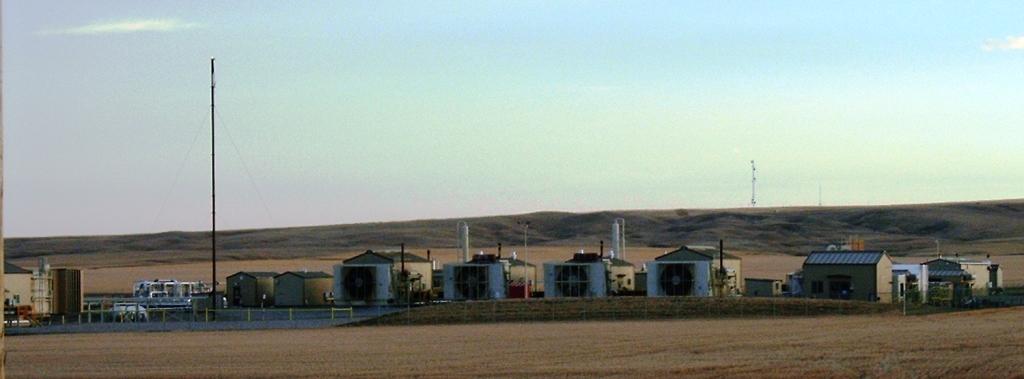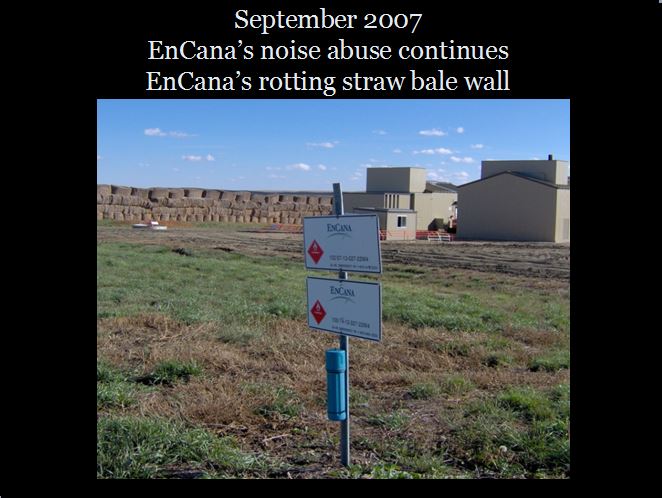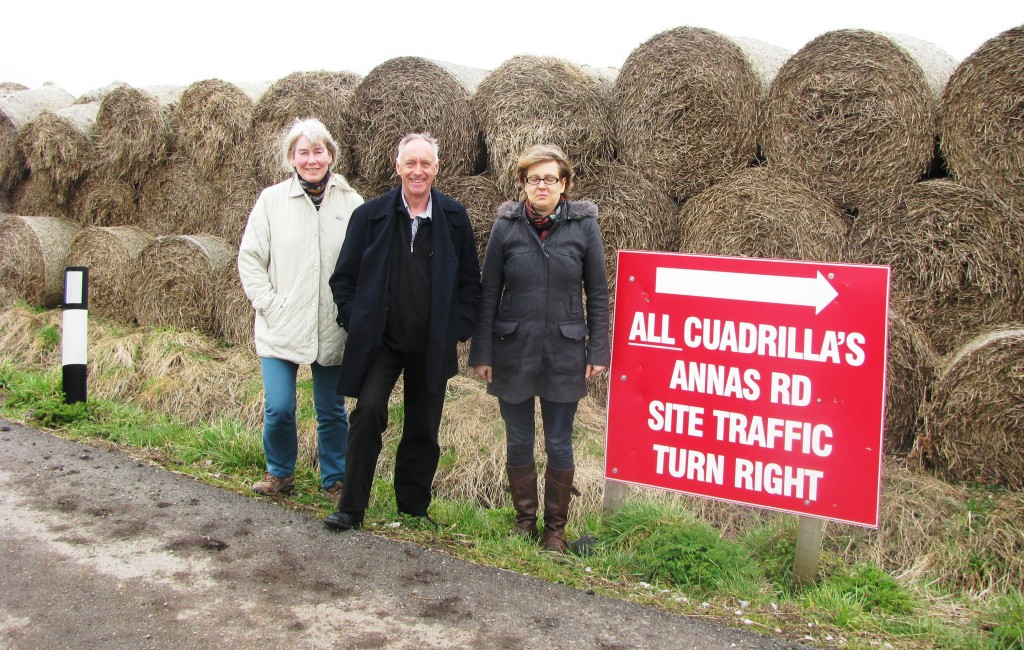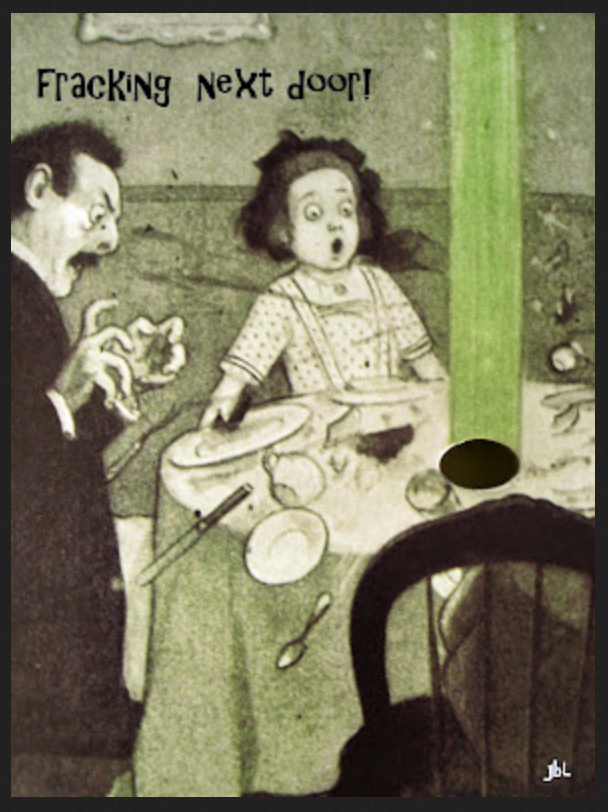
Encana was required by law to complete a noise assessment before installing its endless compressors in the county where I live; the company installed 13 around Rosebud, including two directly sending their noise into the steep coulee that amplifies (by nearly doubling) the noise invading my home. Had the company heeded the law, they would not have installed those two compressors where they did.
I believe Encana didn’t follow the law and complete those assessments because they knew the results would direct them to move their compressors to a location where the noise would not be so dramatically amplified. And because they know they control the regulator, ERCB then EUB next ERCB again, now AER, and can do as they please, laws be damned. Encana doesn’t give shit about the families, communities, livestock, pets, wildlife, song birds, etc it harms; it just cares about money, big propaganda, lots of secrets and lies, and doing what it wants, f*ck the rules, f*ck the law.
The 7-13 compressor first installed by Encana had zero noise attenuation – that’s how little they care about noise regulations and protecting the communities they invade. They only added some stingy attenuation after most of the community complained. Post construction attenuation is rarely sufficient.
Instead of enforcing the noise laws in Alberta, AER enabled the frac crimes, and in Encana’s case at Rosebud, even went so far as to fudge the noise data that Encana collected which proved the company’s compressor noise was louder than permissible. The AER (I expect directed by Encana) used my correspondence detailing the company’s law violations to deregulate their noise directive to make Encana’s noise violations non violations.
“World Class” regulation, but only for law violating corporations and the raping rich.
Noise is all around us. And it’s harming our health, It may seem like just an annoyance, but noise has an impact on our bodies by Isabelle Gallant, Jul 1, 2023, CBC News
The rumble of trucks passing on the highway. The hammering of a construction site. The roar of an airplane taking off overhead.
If you live in a big city in Canada, chances are you regularly hear noises that are harmful to your health.
And though small towns and rural areas tend to be generally quieter![]() But not when they’re frac’d
But not when they’re frac’d![]() , loud sounds like trains passing can still be disruptive.
, loud sounds like trains passing can still be disruptive.![]() Trains used to pass through Rosebud until Steve Harper dismantled the rail line for the steel. Trains never bothered me or my dogs, because a minute later, the noise was gone. Encana/Ovintiv/Lynx compressors however, drone illegally on and on and on, 24/7 with the noise much louder when temperatures drop, eg at night in spring, summer and fall, when it’s human (during and after rains) and in winter.
Trains used to pass through Rosebud until Steve Harper dismantled the rail line for the steel. Trains never bothered me or my dogs, because a minute later, the noise was gone. Encana/Ovintiv/Lynx compressors however, drone illegally on and on and on, 24/7 with the noise much louder when temperatures drop, eg at night in spring, summer and fall, when it’s human (during and after rains) and in winter.![]()
“We think of noise as simply an annoyance,” said Hugh Davies, a professor in the school of population and public health at UBC.
“We’re bathed in an acoustic sea. And I think it’s hard for people to realize that some of that is hazardous,” he said.
Noise regulations in North America are generally piecemeal, experts say, and tend to focus on things like parties or concert venues, instead of the sources of noise that actually cause us the most harm: noises from transportation.
But there is plenty of research to show that being regularly exposed to loud traffic noises, as many Canadians are on a daily basis, can have harmful long-term health effects beyond just our hearing.
How do we experience noise?
Our nervous systems have evolved to be constantly on guard, and that includes hearing, Tor Oiamo told Dr. Brian Goldman, host of CBC’s The Dose.
“While we might not wake up, we might not be annoyed or disturbed by a sound, we’re still going to register those sounds and our nervous system is still going to process that,” said Oimao, an associate professor in geography and environmental studies at Toronto Metropolitan University.
This is why our alarms wake us up in the morning, said Davies.
“You’re always listening. Even in the middle of the night, your brain is processing sound,” he said.
Fight or flight
Hearing a noise sets up our fight-or-flight response, said Erica Walker, an assistant professor of epidemiology in the school of public health at Brown University in Providence, R.I.
“Your heart rate increases. You begin to sweat. You begin to release these hormones that get you prepared for battle — or prepare you to run away from it,” said Walker.
That ongoing stress response over time can lead to adverse health outcomes.
How noise harms our health
For decades, research has shown that rates of cardiovascular disease are elevated among people who are exposed to higher levels of noise.
Davies has been studying this issue for years, and has used population-level health data in Vancouver to show that heart disease rates are higher for people living in noisy neighbourhoods.
To do that research, he and his team used a map of the noise levels in B.C.’s lower mainland, which was the first of its kind in Canada at the time the study came out in 2012.
Using the same data, Davies found higher diabetes rates as well as reduced birth weight among babies whose mothers lived in noisy areas.
There has also been research showing that at schools with chronic airplane noise, elementary students had lower reading scores.![]() Think of kids living and trying to learn in a frac field.
Think of kids living and trying to learn in a frac field.![]()
What is safe sound?
The World Health Organization recommends that average noise exposure to road traffic should be no louder than 53 decibels during the day, and no more than 45 decibels at night.
For reference, 53 decibels is about the noise level of a quiet residential street.
As the traffic noise outside your window gets louder, your risk of ischemic heart disease goes up, said Oiamo, because your body’s response to noise can cause elevated levels of stress hormones and an increased heart rate.
A fairly busy road has an average decibel level of 61, he said.
“Most of us living anywhere near anything other than a very quiet side street will have that type of noise level,” Oiamo said.
Noise is affected by urban planning
For Walker, noise isn’t just a public health concern — it’s also an environmental justice issue.
At Brown University, she runs a lab where she works with people trying to deal with noise in their neighbourhoods.
Walker said the noise issues she sees are the result of poor urban planning practices, such as building neighbourhoods near airports, industrial activities or major highways.![]() What when quiet rural homes/communities are invaded by frac’ers knowingly violating laws with 24/7 noise abuse?
What when quiet rural homes/communities are invaded by frac’ers knowingly violating laws with 24/7 noise abuse?![]()
The communities she works with are usually home to lower-income people who are often racialized.
“We decide that we will dump our acoustical trash in those communities where they just don’t have the power to organize and fight back,” Walker said.![]() Same with the frac’d. And, the few that do try to fight back, get stabbed in the back by their lying, quitting rule violating lawyers, in my case, Murray Klippenstein and Cory Wanless.
Same with the frac’d. And, the few that do try to fight back, get stabbed in the back by their lying, quitting rule violating lawyers, in my case, Murray Klippenstein and Cory Wanless.![]()
“Do we need to put condominiums or apartment houses next to a highway? Do we need to put schools next to a highway?”![]() Seems most developers and municipalities/councils don’t give a shit, it’s just about money for them. The oil and gas industry is a health harming invasive noise polluter, and most companies and
Seems most developers and municipalities/councils don’t give a shit, it’s just about money for them. The oil and gas industry is a health harming invasive noise polluter, and most companies and ![]() de
de![]() regulators don’t give a shit either. It’s about maximizing profits, no matter who gets harmed, or how. Noise can be attenuated, but that costs money, so it’s feeble at best and lied about, or non existent.
regulators don’t give a shit either. It’s about maximizing profits, no matter who gets harmed, or how. Noise can be attenuated, but that costs money, so it’s feeble at best and lied about, or non existent.![]()
Low-income communities have fewer resources to fight noise pollution, so the ‘powers-that-be’ dump all of their acoustical garbage right at their front door, leading to ‘acoustic inequity.’
The acoustical soundscape — and not just the landscape — needs to be considered in planning decisions, said Walker.
Tor Oiamo in Toronto has a similar perspective.
“You’re not going to eliminate cars. You’re not going to eliminate transportation sound. But we can do a better job of keeping those away from people,” he said.![]() Planes, trains, cars, air conditioning units, refrigerators, drilling and frac operations/compressors, etc. can be quiet, but, companies making/operating them don’t want to spend the money or set precedent, so humans are being exposed to ever more and louder health harming noise.
Planes, trains, cars, air conditioning units, refrigerators, drilling and frac operations/compressors, etc. can be quiet, but, companies making/operating them don’t want to spend the money or set precedent, so humans are being exposed to ever more and louder health harming noise. ![]()
How can we reduce the noise around us?![]() #1: Stop having so many kids; as billions more humans pop into the world, more and louder noise does too. #2 Criminalize regulators deregulating while lying to the public saying they are increasing regulation. #3 Criminalize politicians like Danielle Smith conning the public with comments about “streamlining” approval processes to improve efficiency (which means in reality removing regulations or deregulating to let extraction industries get away more easily and cheaply with their rape and pillage for the rich).
#1: Stop having so many kids; as billions more humans pop into the world, more and louder noise does too. #2 Criminalize regulators deregulating while lying to the public saying they are increasing regulation. #3 Criminalize politicians like Danielle Smith conning the public with comments about “streamlining” approval processes to improve efficiency (which means in reality removing regulations or deregulating to let extraction industries get away more easily and cheaply with their rape and pillage for the rich).![]()
For many of us, reducing noise in our environments can be cost-prohibitive, such as moving to a quieter neighbourhood or soundproofing our homes.![]() Just months before Encana’s frac’ing invaded my community and home, I spent a small fortune on triple paned windows and shutters to reduce my fossil fuel pollution. One of the noise consultants advised me that – unfortunately for me and my dogs – they amplify Encana/Lynx’s noise into the house. Had I been consulted, and informed my community was going to be invaded by frac’ing, I would never have spent the money improving my home or to reduce emissions (a tragedy of which includes the emissions I reduced are wiped out by my frac’d water well now spewing massive amounts methane, a much worse greenhouse gas than CO2.
Just months before Encana’s frac’ing invaded my community and home, I spent a small fortune on triple paned windows and shutters to reduce my fossil fuel pollution. One of the noise consultants advised me that – unfortunately for me and my dogs – they amplify Encana/Lynx’s noise into the house. Had I been consulted, and informed my community was going to be invaded by frac’ing, I would never have spent the money improving my home or to reduce emissions (a tragedy of which includes the emissions I reduced are wiped out by my frac’d water well now spewing massive amounts methane, a much worse greenhouse gas than CO2.![]()
If you have the option, consider which side of the home your bedroom is on, said Davies.
“Noise varies dramatically from one side of the house to another, so you could move to a quieter part of the house to sleep,” he said.
Experts also recommend informing yourself about the noise around you by measuring the decibel levels on your phone.
For iPhone users, Oimao recommends an app developed by NIOSH, the National Institute for Occupational Safety and Health at the U.S. Centers for Disease Control and Prevention.
The app isn’t available for Android, but there are other noise apps users can download.
Other than that, and stocking up on earplugs![]() pathetic
pathetic![]() , experts say fighting back against noise requires larger policy solutions.
, experts say fighting back against noise requires larger policy solutions.
“I’ve been working with communities that have been fighting over issues for many years with no moving of the needle,” said Walker.
Her advice?
“Collect data, show up when your voice is needed, but give input.”
![]()
Refer also to:

Encana manager Mark Taylor promised Rosebud residents there would never be more than two compressors in a row installed in our community, after the above was already in place.

To con the community and visitors to Rosebud Theatre (about 50,000 annually), Encana installed the above fire/explosion risk straw bale wall and replaced it a few times because it kept rotting and falling over. It never mitigated the noise at my place. Encana’s own noise expert told me the compressor noise would just roll over the wall, amplify via the coulee into my home as usual. Encana’s stupid straw bale wall was propaganda that pleased stupid people.

Who in their right mind installs a fire risk beside a flammable frac’d gas facility?
Bullying idiots like frac’ers, enabled by our bullying deregulating idiot “regulators.”

Frac’ers in the UK tried the same propaganda baloney. But citizens there are more courageous and intelligent, and less corrupt than Albertans. They got frac’ing banned.
New study: Songbirds’ reproductive success reduced by natural gas compressor noise.
University of Michigan researchers on noise: Turn down the volume for health’s sake
Fracking firm stops drilling in Balcombe after “rattling” noise complaints

